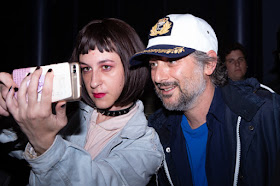“My dad loved movies, so he would take me to movies when I
was young,” Korine explained. “I was a skateboarder, so I’d skate during the
day. At night, I would go [to the theater]…every day you could see a W.C.
Fields movie or a Douglas Sirk film, or Buster Keaton. I just loved it so much.
I just felt early on that I could do it.”
Korine shared that he always knew he wanted to write his own
scripts. "I felt like I could figure out the technical
part of making movies on my own, but I never wanted to depend on anyone to
write scripts for me. I always wanted to make my own work, I never wanted to be
dependent upon anyone. I wanted to learn to be a writer.”
 |
| A still from Korine's GUMMO, 1997. |
 |
| Korine poses with a fan after the screening. Photo credit: Silvia Schablowski |
A celebrated element of Korine’s work is its reoccurring subject matter. Korine’s films often showcase characters and events
that are otherwise absent from traditional cinema, and Korine cited this trend
as part of his goal to highlight “different types of people that you never see
on the screen.” He elaborated, “What I always try to go for, especially
when I was younger, is something I would call beyond a simple articulation.
It’s more of a feeling. It’s like if I see something or I put something
together, and I feel like there’s a power to it. Maybe it’s upsetting,
confrontational, maybe it is provocative, but if it feels like there’s a power
to it, then I want to use it. I like things that you can’t explain. I like
things that take your breath away, and I like looking at people that you don’t
often see on the big screen. I like to be surprised. I hate that we’re starting
to live in a culture where everything is so offensive to everyone, and you
can’t look at anything; discuss things anymore. Life is beautiful, and I want
to explore the complexities and the intricacies of the whole thing.”
 |
| Korine's friend Alex Rose moderated both evenings' Q&As. Photo credit: Silvia Schablowski |

